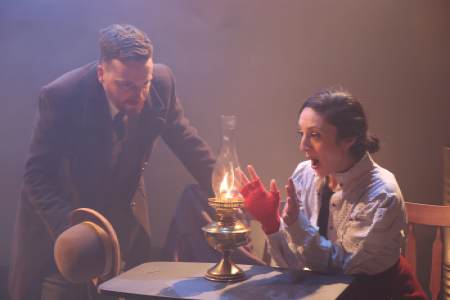ARC‘s latest production, OIL follows the lives of May (Bahareh Yaraghi) and her daughter Amy (Samantha Brown) through a swirling collision of empire, history and family.
Set through time as a a five-part, two-act play spanning 200 years, Ella Hickson’s play starts in 1889 at the dawn of the industrial age to 2051, in a now futuristic post-petroleum world.
Mother-to-be May leaves rural Cornwall (England) in 1889 tempted by a salesperson with promises of new opportunities thanks to the invention of a kerosene lamp. As she jumps time, she and little Amy are now in Tehran in 1908. She is struggling to make ends meet. That is, until she seizes an opportunity to go back to England and reinvent herself. Time jumps again and it is now 1970. May is a sixteen year-old butting heads with May, who now works for an oil company as an executive. As Amy now describes her mother, May is “a capitalist”. This period of their lives and their relationship does not end well.
Jump again, now to Kurdistan in 2025. A grown up Amy is helping locals in a humanitarian capacity. May continues her work with the oil company and their exploitation of the precious commodity. Their journey culminates back in Cornwall in the year 2051. At this time, a new sales person with a new power sources comes to town.

The mother-daughter relationship helps drive the story forward. Theirs is a conflicted relationship. May acts like every action and decision she makes is for Amy’s benefit in the long term. Amy fights to have freedom to choose and be whom she sees herself to be.
May and Amy present us different sides of the argument in terms of the importance of new inventions, but also about the exploitation of resources by colonizing powers. May embodies the ‘kingdom or empire’ — in this case England — while Amy can be said to embody other countries the kingdom aims ‘to protect for their own good’.
OIL tackles many other themes; including that of occupation, exploitation, and limiting resources. Throughout the show we are asked to question who is in power; who has the right to extract resources all in the ‘promise’ of bettering the world; who benefits from invention and resource exploitation? OIL challenges us to pay attention at all times.

There is much to like in OIL. I particularly like the use of non-English languages. It places the show and this story into current times. It adds other layers into the show, intellectually and emotionally.
There is also great use of space and excellent set design by Jackie Chau, who chose to use oil drums as props throughout the show. Lighting is used very effectively thanks to the thoughtfulness of Nick Blais. Music and sound design by Maddie Bautista were also complementary to the entire show.
Let me not leave out the cast; they are all great. Definite kudos to Brown, Yaraghi and Ryan Hollyman. Their individual performances are raw, honest, and at times perplexing moving — as in the case of Hollyman’s Thomas, whom I found a conflicting yet likable character. They all stand out but also work so well within the larger group.
OIL is a tour de force. There is no moment lost in its entirety. It is another example of ARC’s high calibre of relevant works.
All photos by Nicholas Porteous.






